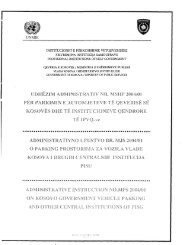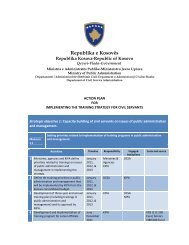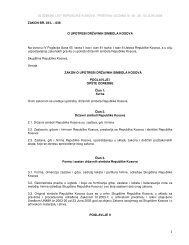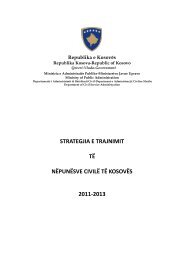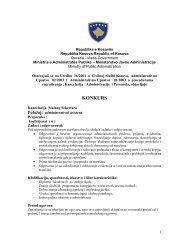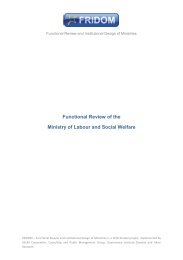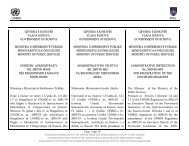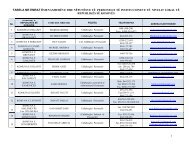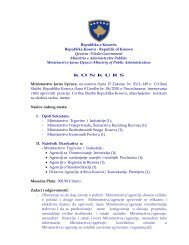Download
Download
Download
Create successful ePaper yourself
Turn your PDF publications into a flip-book with our unique Google optimized e-Paper software.
Continuous Professional Development in the Department of Strategic Management). The Centre for<br />
Telemedicine supports the hospitals (15 staff).<br />
Issues identified by staff in the MOH, hospitals and other agencies in relation to secondary and<br />
tertiary services include the following.<br />
Allocation of roles and responsibilities- lack of delegated power<br />
Decision making on technical and routine matters sometimes occurs at the political level that<br />
sidelines the technical level.<br />
There are frequent interactions some staff members with the PS on operational matters.<br />
Overload on PS with hospitals and NIPH reporting directly to the PS while the Office of<br />
Hospital Institutions is vacant and has no active role. This also causes an overload on the<br />
Director of Health Services as this Director analyses the performance reports. Consideration<br />
could be given to clarifying the nature of the reporting to the PS or Minister for health sector<br />
agencies, being in the nature of very high level matters such as signing off accountability<br />
documents (see Appendix G). Regular and ad hoc performance reporting could be provided<br />
to the Office of Hospital Institutions and it could take on the relationship management role<br />
and related tasks.<br />
There may be opportunities to improve the allocation of roles and responsibilities for the<br />
education functions in the Department of Strategic Management and the education functions<br />
in the Department of Health Services. We were advised that a third centre for professional<br />
education may be set up soon which seems unusual given the current number of centres<br />
and the fragmentation of these between two departments.<br />
Health services are not represented well at senior management level<br />
Lack of profile at senior levels for the health services and overload on the Director of Health<br />
Services. As noted earlier, there are many corporate service functions with direct reports to<br />
the PS. There is an opportunity to consider raising the position of the various health<br />
services and providing integrated policy, planning and service monitoring functions for<br />
service areas including secondary and tertiary services. There is no function for<br />
systematically monitoring and reporting on the performance in secondary and tertiary health<br />
care (Division of Health Care head vacant and Office for Hospital Institutions vacant). Policy<br />
making is also very limited.<br />
Process problems<br />
Many staff mentioned issues with delays and wasted effort in getting routine things<br />
processed and approved. The major services and outputs of the MOH could be specified<br />
and then the processes underpinning the production of these services and outputs could be<br />
examined to find ways to streamline them and make them more efficient. This can involve<br />
many changes like removing unnecessary steps, using IT solutions to reduce the need to go<br />
from office to office to get things done, making information more readily available on the<br />
intranet, etc.<br />
Cultural practices affecting performance<br />
Departments and agencies reporting to the PS and minister do not always cooperate well<br />
and freely exchange information, despite weekly meetings for directors and meetings for<br />
wider groups. Examples were given of staff members not being willing to share draft strategy<br />
documents within the MOH and performance reports from agencies not being made<br />
available to the departments that have monitoring roles. There are many ways to address<br />
this problem including requiring cooperation in job descriptions and assessing performance<br />
in relation to this; making information available on the intranet; and treating non cooperation<br />
as a serious performance issue for the director or manager causing problems.<br />
There is a large use of working groups to do core roles like producing strategies and<br />
monitoring these, which may be necessary in the short term, but capability should be<br />
developed in the MOH. Sometimes tasks are given to working groups that they are unlikely<br />
to be able to do given their incentives, such as working on the organisational structure of the<br />
ministry. This involves many personal interests and requires leadership from the top, rather<br />
than placing this task with a group of directors that will include winners and losers from the<br />
changes. Working groups can be advisory, but should not be doing core MOH technical<br />
functions.<br />
20



